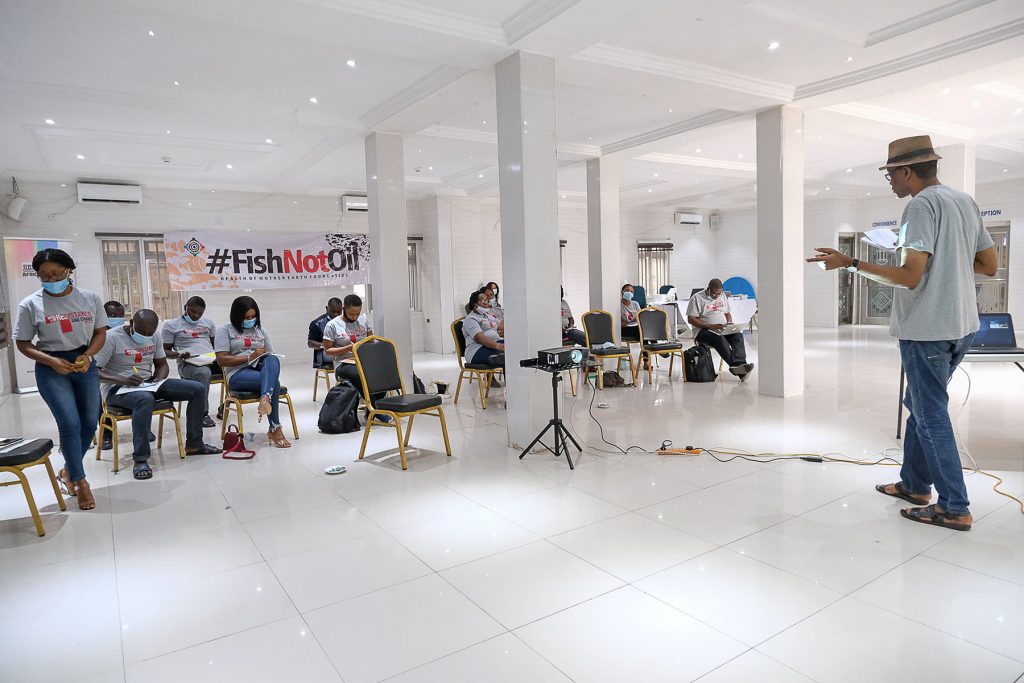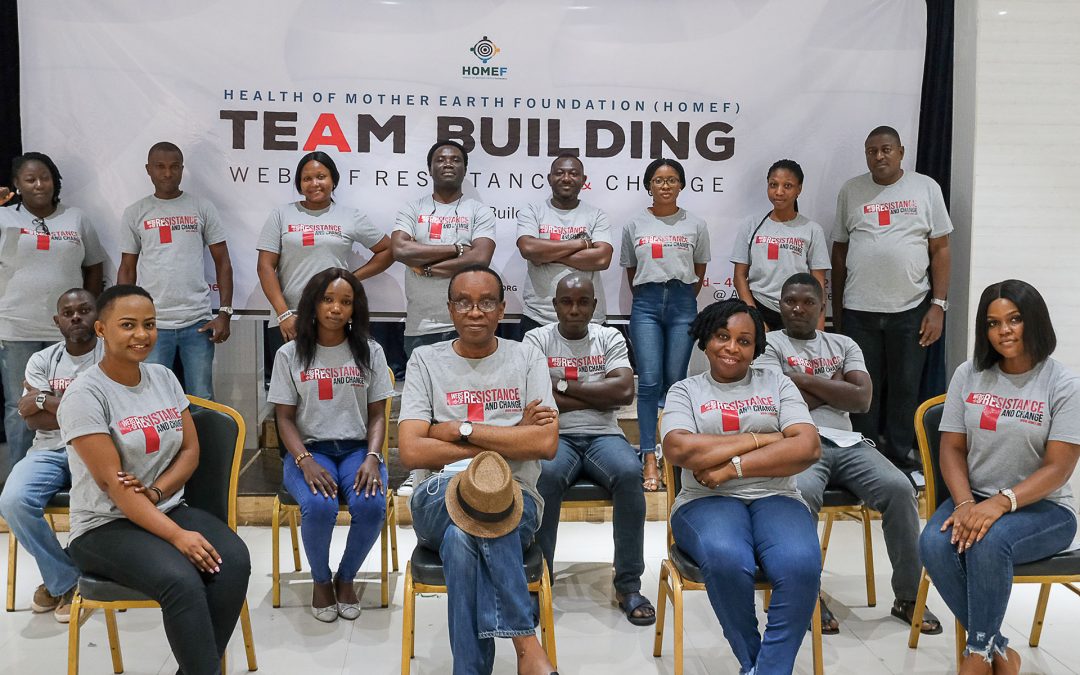The environmental issues and challenges that the world battles with today are so complex that communities, groups and movements have to come together to form strong alliances so as to effectively resist the forces that are responsible for these issues and bring about a meaningful change. To champion this cause in 2021, Health of Mother Earth Foundation (HOMEF) is focused on building webs of resistance and change (alliance building). In order to strategise and plan to achieve this objective and other key organisational objectives, HOMEF brought together team members, board members, partners and volunteers at its team building and annual general meeting held in Asaba, Delta State, Nigeria, from 1st to 5th February 2021.
During the event, it was understood that building alliances and webs of resistance would necessitate strategic connectivity, strategic messaging, ethically-grounded activities, transforming narratives and putting the health of Mother Earth at the centre of all activities.
Strategic connectivity leads to alliance building without which strong resistance cannot be built to defend communities, promote climate resilience, support sustainable practices like agroecology and stand against ecocide, environmental racism, neocolonialism, inequalities, gender discrimination and destructive extraction of resources.
In a session on ‘Advocacy: Building Resistance and Provoking Change,’ activism and advocacy were described as connected and vital tools in Building Webs of Resistance and Change. Activists were defined as people working towardssocial change/transformation; people asking questions that threaten the status quo; people trying to uncover the dynamics that make people unable to earn a living. The overarching target of an activist is to ensure that the conditions that put people in bad situations are changed.
During a session on ‘Use of Research in Building Resistance and Provoking Change,’ insights were shared on what makes up effective research for mounting resistance to injustice and instigating change. It was noted that such research would involve sourcing credible information from community people (whose testimonies are primary data), the internet, conversations of people on social media, local and national agencies, government public records, government legislations, non-governmental organisations/civil society groups, exhibitions, conferences, news media and opinion polls.
Another session on ‘Building and Sustaining the Team/Network/Alliances’ shared the fundamentals of alliance building and maintenance. It was noted that in forming alliances, the critical issues to consider include a) the commonality of the goal of every group in the alliance, including the funders; b) who would be representing one’s organisation in the alliance; and c) the need to have groups from different fields, for example, economists, researchers, farmer associations, etc.
The meeting provided space for strategising for HOMEF’s work in the Oilwatch Network and for discussions on fossil and mining conflicts in Nigeria and Africa. The Oilwatch Network aims to resist fossil fuel activities in tropical countries in Africa and in the Global South. It does this by exposing the negative impacts of extractive activities and establishing a link between the destruction of biodiversity, climate change, human rights violations and the role of multilateral financial institutions.
It was noted that in some communities in Kogi and Benue States, the mining companies have some of the community members speaking for them. Those who stand against the companies are seen as anti-development. An example is Okwori Onaji, a community activist in Benue State who was framed and attacked in 2020 by some of his community members for trying to protest against the negative impacts of the Owukpa Consolidated Mining Company.
These conflicts, incidences of pollution from extractive activities and the use of dangerous technologies in agriculture, leading to the loss of biodiversity and many more ills, make ‘building webs of resistance and change’ an urgent issue.
Plans for all the activities under all of HOMEF’s key work areas (Fossil Politics, Hunger Politics, Ikike and Alliance building) were discussed in detail; strategies were fine-tuned and recommendations made for better outcomes and outputs. One of the projects for the year 2021, titled Shifting the Power Lines, focuses on the sustainable energy path. It also aims at challenging current imaginaries on which exploitative, polluting, wasteful and unjust systems have been built and to unlock the world from the grip of fossil energy dependency. These can be achieved especially through building stories (participatory grassroots stories), looking up from the past and looking back from the future.
Some of the project’s objectives are to a) work with governments to commit to shifting power modes from fossil fuels to renewables with the aim of building a fossil-free future; b) amplify the actions of women and youths in the movement against energy colonialism; and c) promote participatory research work among activists and academics etc. This project will involve Oilwatch groups in Latin America and Southeast Asia.
Activities planned with other networks were also discussed. For example, there was space for brainstorming on the FishNet Alliance and the Ecological Defense Network. Also, some light was shed on the project ‘Promoting Agroecology and its Inclusion in Nigeria’s Climate Change Policies.’ The project is planned in collaboration with the Alliance for Food Sovereignty in Africa as well as farmers, CSOs, researchers and media practitioners in Nigeria. Resolutions from the session on the agroecology project include the need: to increase the number of farmers to be trained on agroecology, use strong media strategy to achieve the project’s goals and to effectively engage with policymakers.
Other planned activities include biosafety conference and rally; conversations series on Thomas Sankara (which has already taken place), on ecocide, on Frantz Fanon and on AfriTAP; School of Ecology on various subject areas; stilt dialogues; and agroecology workshops with farmers, policymakers and other stakeholders, etc.
There were also discussions on content creation, documentaries and use of stories; project planning, implementation and reporting; effective social media use and communication/branding strategy; and ideas for effective administration and coordination within the team.
At the end of the meeting, team/board members, as well as other partners who participated, were energized as all had a strong understanding of HOMEF’s focus and strategy for the year. The sessions were highly interactive and interesting, with exercises that promoted better understanding among team members and partners.
Participants joined the event in person from Benin City, Abuja, Lagos, Port Harcourt, Bayelsa and Asaba, while others joined via Zoom from Lagos, the Philippines and Brazil.






